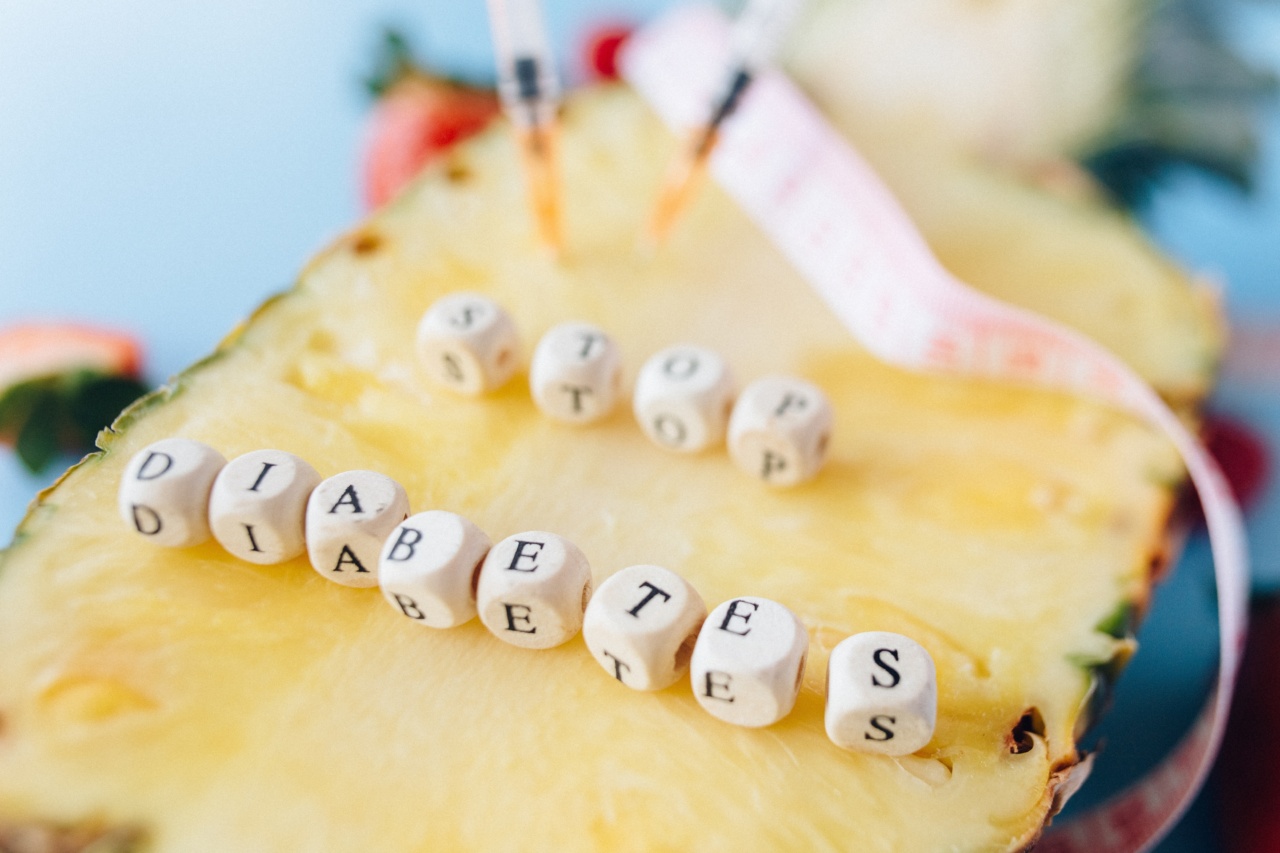Diabetes is a chronic condition that affects millions of people worldwide. It is characterized by high levels of sugar in the blood, which can lead to various complications if not properly managed.
While there is no cure for diabetes, there are several techniques that can help individuals keep their blood sugar levels under control. In this article, we will explore two of these techniques and discuss how they can make a significant difference in managing diabetes.
1. Regular Exercise
Exercise is crucial for individuals with diabetes as it helps lower blood sugar levels and improves insulin sensitivity.
Engaging in physical activity regularly can also contribute to weight management, reduce the risk of heart disease, and boost overall well-being. Both aerobic exercises, such as walking, jogging, cycling, and swimming, and strength training exercises, like weightlifting or resistance training, are beneficial for diabetes management.
When incorporating exercise into a diabetes management plan, it is essential to start gradually and speak with a healthcare professional before beginning any new exercise routine.
Monitoring blood sugar levels before, during, and after exercise is also recommended to understand how physical activity affects individual responses. It is important to stay hydrated, wear comfortable footwear, and listen to the body’s limits during exercise.
Strive for at least 150 minutes of moderate-intensity aerobic activity per week, distributed across several days, along with two or more days of strength training exercises.
2. Healthy Eating Habits
Diet plays a vital role in managing diabetes and keeping blood sugar levels in check. Adopting healthy eating habits can significantly improve overall glycemic control, reduce the risk of complications, and promote overall well-being.
Focus on consuming a well-balanced diet that includes a variety of nutrient-dense foods. Incorporate plenty of fruits, vegetables, whole grains, lean proteins, and healthy fats into meals.
Avoid or limit the intake of highly processed foods, sugary beverages, refined carbohydrates, and excessive sodium. Instead, opt for natural sweeteners like Stevia or choose foods with a low glycemic index to help prevent spikes in blood sugar levels.
Portion control is also essential. Counting carbohydrates, reading food labels, and being mindful of calorie intake can assist in maintaining stable blood sugar levels.
It may be helpful to consult a registered dietitian or nutritionist specializing in diabetes management to receive personalized guidance on meal planning and carbohydrate counting.
Maintaining a Healthy Weight
Managing body weight is fundamental in diabetes management. For those who are overweight or obese, losing even a small amount of weight can lead to significant improvements in glycemic control.
Weight loss helps increase insulin sensitivity, making it easier for the body to utilize insulin effectively.
A combination of regular exercise and healthy eating habits is key to achieving and maintaining a healthy weight.
By adopting a calorie-controlled diet, engaging in physical activity, and creating a calorie deficit, individuals can shed excess weight and improve diabetes management. It is crucial to set realistic goals and focus on long-term lifestyle changes rather than short-term diets.
Medication and Insulin Therapy
While lifestyle changes are crucial in managing diabetes, medication or insulin therapy may also be necessary to keep blood sugar levels under control.
For individuals with type 1 diabetes, insulin injections or an insulin pump are essential for regulating blood sugar levels. Type 2 diabetes may also require oral medications, injectable medications, or insulin to manage the condition effectively.
Strict adherence to medication schedules and regular consultations with healthcare professionals are crucial in optimizing diabetes management.
It is essential to discuss any concerns or potential side effects with a healthcare provider to ensure the chosen treatment plan is effective and suitable.
Regular Monitoring and Blood Sugar Testing
Regular monitoring of blood sugar levels is vital in diabetes management. It provides valuable insights into how specific foods, physical activity, medications, and overall lifestyle choices affect blood sugar levels.
Monitoring also helps identify patterns and allows adjustments to be made accordingly.
A blood glucose meter is a simple and effective tool for self-monitoring blood sugar levels. Healthcare providers may recommend different testing schedules depending on individual circumstances.
It is essential to keep a record of the test results and share them with healthcare professionals during regular check-ups or appointments to evaluate and adjust the diabetes management plan as needed.
Adequate Sleep and Stress Management
Getting adequate sleep and effectively managing stress are often overlooked but essential aspects of diabetes management. Lack of sleep can lead to increased insulin resistance, higher blood sugar levels, and cravings for unhealthy foods.
Aim for seven to nine hours of sleep per night and establish a consistent bedtime routine to improve overall sleep quality.
Stress, whether physical or emotional, triggers the release of hormones that can lead to elevated blood sugar levels.
Implement stress management techniques such as deep breathing exercises, meditation, yoga, or engaging in hobbies to reduce stress levels. It is also important to prioritize self-care and allocate time for activities that bring joy and relaxation.
Regular Medical Check-Ups
Regular medical check-ups are essential for individuals with diabetes to evaluate overall health, monitor blood sugar control, and detect any potential complications at an early stage.
Healthcare professionals may conduct a comprehensive physical examination, review blood test results, and provide personalized recommendations based on individual needs.
Medical check-ups also offer an opportunity to discuss any concerns, ask questions, and stay informed about the latest advancements in diabetes management.
Attend appointments as scheduled and communicate openly with healthcare providers about any changes in symptoms, lifestyle, or medication adherence.
Conclusion
Effectively managing diabetes requires a multifaceted approach.
Regular exercise, healthy eating habits, weight management, medication adherence, blood sugar monitoring, adequate sleep, stress management, and regular medical check-ups are essential techniques to keep blood sugar levels under control. It is important to remember that diabetes management is a lifelong commitment and may require adjustments over time.
By incorporating these techniques into daily life, individuals with diabetes can minimize complications, improve overall well-being, and lead a fulfilling life despite the challenges presented by the condition.































